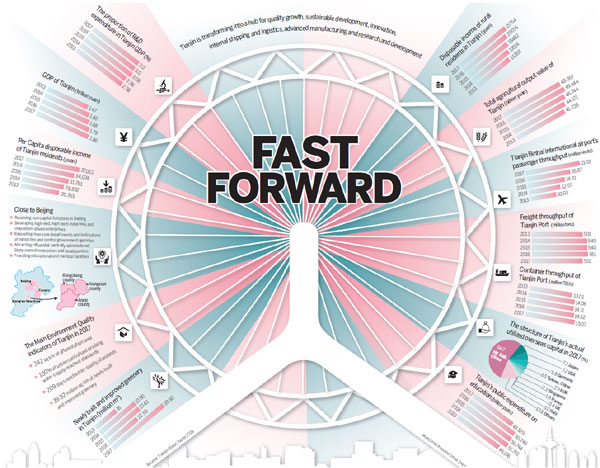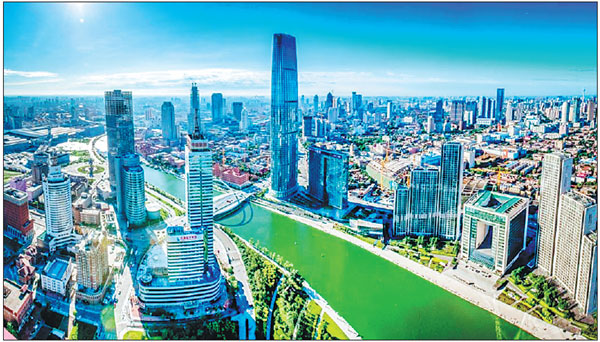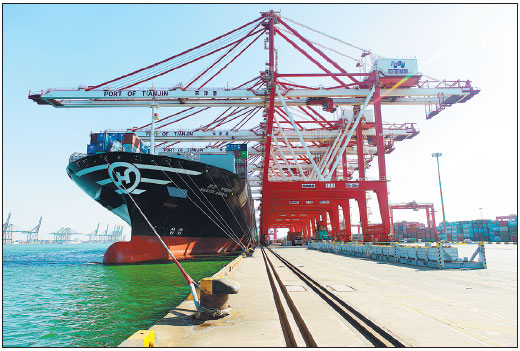Davos spirit helps to keep Tianjin buzzing
The city, whose citizens have open minds and broad horizons, has long been open to the world, and the annual summer meeting has reinforced that quality
About a century ago the city of Tianjin was a buzzing commercial center in northern China that served as a gateway to the world.
Times, of course, have changed, but the city's ability to encourage relationships across the oceans and seas has, if anything, grown stronger.
Nothing epitomizes this more than its hosting its hosting the Annual Meeting of the New Champions, widely known as the Summer Davos, for the past 10 years or so. The event provides Chinese businesses opportunities to keep abreast of what is happening with the world economy and, in turn, gives overseas business a profound and broad insight into what is happening in China economically and in other fields.
Klaus Schwab, founder and executive chairman of the World Economic Forum, proposed the idea of China hosting the Summer Davos in 2005, and a year later the forum's Beijing office opened.
The first Summer Davos was held in Dalian, Liaoning province, in 2007.
At the height of the world economic crisis in 2008, the Summer Davos moved to Tianjin, where global economic and business leaders gathered to seek solutions.
Since then, the two cities have taken turns in hosting the annual event.
The Summer Davos is the top international meeting held in Tianjin and has helped it reinforce that dynamic image whose seeds were sown a century ago. The conference is also pivotal in spurring growth in the local conference and exhibition industry.
Austin Okere, founder of Computer Warehouse Group, is a regular visitor to the Summer Davos. Tianjin has made substantial progress in transport infrastructure and hospitality development, he said.
After the Meijiang Convention and Exhibition Center, a new venue for the event, opened in 2010, 60 to 70 events were held there throughout the year.
In 2016 nearly 400 conferences and exhibitions were staged in the center.
When the Summer Davos was first held in Tianjin in 2008 the city had seven five-star hotels, and this had increased to 15 by 2016.
In addition to improved infrastructure, Tianjin can call on an abundance of human resources and professional services in hosting international events, which has helped it consolidate its reputation among event organizers as a great venue.
Among the events for which Tianjin serves as a permanent venue are the China International Private Equity Forum and the China Mining Conference and Exhibition.
Since 2016, the China Icecream and Frozen Food Industry Expo has been held in Tianjin every October, aiming to create the largest platform for the industry in Asia, organizers said.
The World Intelligence Congress has also taken up what organizers say will be a permanent position in Tianjin last year.
The annual event, hosted by the Tianjin government, the National Development and Reform Commission, the Ministry of Science and Technology, the Ministry of Industry and Information Technology, the Cyberspace Administration of China, the Chinese Academy of Sciences, the Chinese Academy of Engineering and the China Association for Science and Technology, focuses on changes and opportunities produced by artificial intelligence.
During the course of Tianjin's hosting the Summer Davos, China's economy has shifted from an emphasis on high-speed growth to medium-to-high growth.
The Summer Davos has been a kind of witness to Tianjin's rapid growth, said Qi Junyan, vice-president of the Tianjin Academy of Free Trade Area.
"Over the past decade our economy has gone through crucial transformation, with a focus on the speed, quality and structure of growth. Innovation needs to be the main engine for driving economic growth."
The Summer Davos has also created opportunities for Tianjin to become more global economically, local officials said.
As a port city opening up to the world, its citizens have always reflected this, with open minds and broad horizons.
Opening-up has continued in many more fields and relating to diverse businesses, which has helped local companies as they try to go global. Indeed, the participation of local business leaders, academics and government officials in the Summer Davos has helped improve their abilities to connect with the world.
At the same time, visiting experts, political leaders and corporate executives have shared their insights with local communities, making a profound impact on the city, said Li Weian, president of Tianjin University of Finance and Economics.
The Summer Davos, a spinoff of the event held annually during winter in the Swiss resort of Davos, also appeals to small and medium-sized enterprises. Local high-tech SMEs have competed to gain access to the event.
"Taking part in the Summer Davos gave us the opportunity to showcase our strength in research and development and also helped prepare us to go global," said Hao Lei, deputy general manager of Tianjin Jiuri New Materials Co Ltd.
After Tianjin earned its spurs there was an influx of investment projects in diverse fields, including iron and steel, petroleum, new energy and environmental protection.
"The Summer Davos acts as a window through which Tianjin can learn about the world and the world can learn about the city and China," said Zhang Bingjun, board chairman of Teda Investment Holding Co Ltd, who has attended the event many times.
"It's like building a bridge between Tianjin and the world," he said.


Tianjin in northern China has hosted the Summer Davos biennially since 2008. Provided to China Daily

Tianjin Port, one of the busiest of shipping destinations in northern China, helps to facilitate exchanges between the city and foreign countries.

Copyright ©
Tianjin Municipal Government. All rights reserved. Presented by China Daily.
京ICP备13028878号-35

